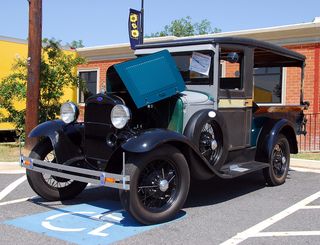
Leadership
Ford Motors Makes an Inventive Leadership Choice
CEO succession from another industry can, if carefully done, infuse new life.
Posted June 21, 2017
Coauthored by Sarah Kellogg
Ford Motor Co. recently handed the wheel to a turnaround chief who executives hope will remake the institution not only for the 21st century but also for an era of transportation flexibility where advanced technology and mobile culture matter as much or more than the name on the vehicle.
In asking new CEO Jim Hackett to be courageous in the face of Ford’s and the auto industry’s unpredictable future, Ford Executive Chairman Bill Ford called for leadership from a man who just may be the best choice to lead the company through its struggles, both structural and image.
Change is the operative word. The challenge for Hackett? American automobile giants such as Ford and General Motors Corp. remain closer in temperament to sluggish, ocean-going oil tankers than the swift and nimble jet boats needed to navigate today’s treacherous waters of global automobile manufacturing and sales.
In addition to structural issues, vehicle manufacturers are facing the disruptive effects of the digital and sharing economies. Studies show that ride-hailing and car-sharing services are displacing and delaying the sales of new cars. The entire industry, including Ford, is already aggressively responding to the revolution of electric cars, shared mobility and autonomous driving, but can they keep up? Silicon Valley is now as important for the auto world was Detroit. Maybe more so.
That’s why Hackett, with his unconventional pedigree for an auto executive, is the right leader for Ford at the right time. He served on Ford’s board of directors (2013 to 2016), so he knows how the board thinks and what it cares about. He was appointed in 2016 to lead Ford Smart Mobility LLC, the subsidiary responsible for steering Ford’s transportation-mobility initiatives, including creating a self-driving vehicle by 2021. He’s been on the inside of Ford’s R&D efforts, and hopefully he’s glimpsed the future.

Research shows that followers are highly skeptical of leaders without credibility, and credibility comes from relationships (every indication is that Hackett is good at that) and expertise (he knows how to maneuver bureaucracies). Bill Ford is emphatic that Hackett’s brief experience in the auto industry isn’t an impediment but rather an advantage. That equals freshness. Hackett isn’t weighted down with decades of history and culture from serving in Ford’s leadership trenches, but he’s been there long enough to get the lay of the land.
It advantageous that he spent most of his career at Steelcase, the Michigan furniture manufacturing giant, because of what he managed to accomplish there. He led an industry-wide cultural transformation, using the platform to rethink human relationships in the workplace and the future of work—ideas we now take for granted.
His Steelcase experience will be crucial in remaking Ford’s matrix management structure, which was effective 10 years ago but is too slow to respond to the minute-by-the-minute changes in transportation mobility today. Hackett has said one of his early priorities will be in having fewer people involved in setting Ford’s strategic direction, which sounds both smart and right.
Equally impressive is that upon retiring from Steelcase, he served a brief stint as athletic director at his alma mater, the University of Michigan. In his 16 months, he reached a $169 million apparel contract with Nike and hired former San Francisco 49er’s Head Coach and UM quarterback Jim Harbaugh to serve as UM’s football coach, thus reviving the football program. No waters are as erratic as those found in academia.
Hackett will lead from a solid platform. Under its previous CEO, Michael Fields, who was forced to retire after three years on the job and 28 years at Ford, the company is financially solid, and it has made advances in mobility, electric vehicles and autonomous driving. While the stock price didn’t reflect Ford’s successes in sales and R&D over the last five years, it was down nearly 40 percent under Fields, it also gives Hackett an easier threshold to operate from.

Hackett has already cleaned house in terms of his leadership team, and it will send a clear message to a fickle Wall Street that the company is serious about remaking its products and image. Constituents like Wall Street and competitors are watching closely, and will not be forgiving if Hackett stumbles even if expectations are low. It’s interesting that Bill Ford will be at the top of the company’s communications structure, but then his name is on the door.
Whether Ford under Hackett is capable of even going in the direction the board envisions is unknowable. The company cannot be changed in a quick-footed, revolutionary fashion. It can only be changed through a steady, strategic evolution. Yet, even a change of one degree for an oil tanker can result in arriving at an entirely new destination.



